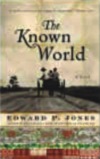|
Book
Review
2004
Pulitzer Prize Winner:
The Known World
Reviewed
by Shannon Bloomstran
It seems
that works of historical fiction often break down into two
camps. One is heavy on the historical, giving us weighty tomes
that are often just textbooks masquerading as novels. In the
other group, heavy on the fiction, characters interact with
21st century sensibilities, the historical settings is a mere
backdrop. As a former history teacher, neither group makes
me happy. I always want people to be excited and engaged with
history; they should view it neither as medicinal nor as fluff,
a tall order, it seems.
Given
that protracted explanation of my preconceived misgivings
with the entire genre, I have to say that I have finally found
an example that artfully blends the two camps, a historical
novel that is both historically illuminating and literarily
challenging. It's The Known World by Edward P. Jones, a nominee
for the 2003 National Book Award in fiction.
Most Americans
are familiar with the tragedy of slavery, but I would wager
a small sum that many are unaware that not all slave owners
were white. Pockets of African American slave owners existed
across the South throughout the antebellum period. One such
former slave turned slave owner is at the centre of Jones'
complex and in-depth novel. Jones' protagonist, is Henry Townsend,
born into slavery in Manchester County Virginia on the farm
on William Robbins, a powerful and by no means benevolent
white aristocrat. Robbins follows the letter and spirit of
slavery laws, however, and allows Henry's father, Augustus
Townsend, to hire himself out, earning enough money to buy
his freedom, then eventually that of his wife and young Henry.

by
Edward P. Jones
"The Known World"
Henry
had somewhat of a glorified position in the Robbins household,
serving as kind of protégé to "Marse"
Robbins, probably from which springs his beliefs in the "natural
order and necessity" of slavery. When Henry grows up,
he purchases several slaves from Robbins, marries a free black
woman and commences to farm his land. Henry is by no means
the sole black slaveholder in Manchester County, the "known
world" of the title, there are several other African
American owners, including a highly educated female teacher.
The novel
moves slowly so as to allow the reader time to acquaint himself
with the large cast of characters, black and white, slave
and free. Jones' characters are intricately rendered, there
is no absolute bad and good as frequently occurs with novels
about slavery or the Civil War. He includes no saintly Uncle
Tom or abolitionist martyr. In addition to the Townsends,
who are horrified when an adult Henry buys his first slave
and the other black slaveholders, we meet Henry's wife Caldonia,
a woman confused and confounded by her passions and beliefs.
Also included are the white sheriff, cruel slave patrollers,
numerous slaves, and Robbins' black mistress and two illegitimate
children. The novel jumps back and forth in time, allowing
each character to emerge as a full person. The switchbacks
and asides are neither confusing nor detrimental to the overall
plot, which really doesn't emerge until around the last 100
pages mainly because by that time, the reader is so engrossed
in the lives and thoughts of the characters that a plot almost
seems superfluous.
The Known
World is certainly not just a pastiche of characters, Jones
allows us enough plot to reveal a true view of 18th century
America in all its complexity. Free blacks sold illegally
back into slavery, the gut wrenching lack of medical care
and the power of land and money for both black and white are
all woven together with an interesting look at domestic habits
and customs.
While
it is certainly not a barn burner, nor an annotated historical
essay, The Known World is a thoughtful and intricate look
into a peculiar aspect of that most peculiar institution.
It is thoughtful, insightful and detailed, something that
does this old history teacher's heart proud.
Source: MostlyFiction.com
Copyright
(R) thedailystar.net 2004
|
